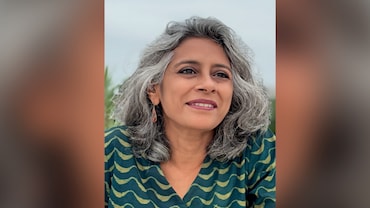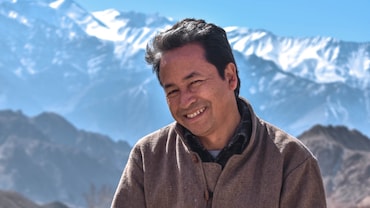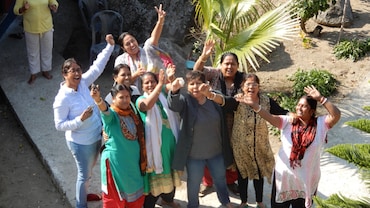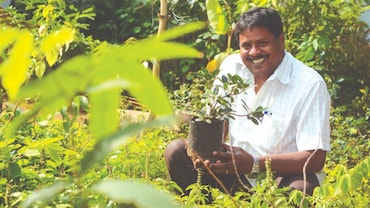- HOME
- /
- Features
- /
- Bonus Read
- /
The Sound of Silence
How shutting up for three months and walking nearly 1,000 kilometres transformed my life
 Katherine Holland
Katherine Holland
As long as i can remember, my mouth has been getting me into trouble. Growing up, I would say anything to get a laugh, no matter how crude or cutting. I used the gift of gab to get what I wanted from my parents (money, a later curfew) and to get out of what I didn’t want (chores, groundings). I was asked to leave four different schools, mostly because I talked too much, and every one of my report cards said some variation of the same thing: I’d do much better if I would just shut up.
My mouth may have served me terribly as a student, but it set me up perfectly for a career in radio. In 2003, I launched a talk show on an AM station in the Toronto area. I would ask people about their religious beliefs and the role faith played in their lives. In my 16 years hosting the show, I interviewed rabbis, nuns, witches, Wiccans and Satanist high priests, and had celebrities, politicians, religious leaders and spiritual gurus share the “why” behind their beliefs.
I think the show succeeded because it engaged people who don’t usually listen to religious radio—people like me. After growing up in a churchgoing household and eventually becoming a pastor, I slowly began to reject organized religion. Still, I was fascinated by others’ beliefs.
Consumed by the need to understand the unknown, I travelled the world in search of answers. I prayed among ancient petroglyphs in Australia, slept at Stonehenge in England and wept at the Holocaust memorial in Jerusalem. I thought I’d find some divine truth if I visited all the sacred sites and interviewed every spiritual leader.
But the only truth I discovered was this: I was a selfish, egotistical, judgmental jerk. It hit me when I was close to turning 50 and almost every significant relationship in my life was in tatters. My wife of 28 years wanted a divorce. My kids weren’t my biggest fans, and when I asked my daughter what I was doing wrong, she told me she didn’t have enough time to explain it all.
I knew this much: The hunt for transcendence made me unbearable. I prioritized my radio-show guests, with whom I might spend an hour, over the people who meant the most to me. I was constantly tearing into anyone whom I perceived as less enlightened than I was. Profanity and sarcasm were my default modes of communication. I drank too much and listened too little. I was miserable, as was everyone caught in my caustic orbit.
My school report cards had been right—I’d do a lot better if I would just shut up. If my mouth was the root cause of my problems, maybe it was time to stop talking altogether.
Years earlier, I’d watched a movie called The Way, starring Martin Sheen. It followed the main character’s journey along the Camino de Santiago, a series of 1,200-year-old trails that converge on the Cathedral of Santiago de Compostela, in northwestern Spain, where the remains of Saint James the Apostle are said to be buried.
So in 2016 I decided to take a three-month sabbatical from the radio show and walk the almost 1,000-kilometre route without saying a single word. My plan was to finish the trek on my 50th birthday as a changed man.
 D.G. Marshall in a moment of quiet contemplation. Photo credit: courtesy of D.G. Marshall
D.G. Marshall in a moment of quiet contemplation. Photo credit: courtesy of D.G. Marshall
When I arrived at the start of the Camino, in early October 2016, I was already worried that my quest was doomed. I was terrified that I’d accidentally speak, that my bum knees would prevent me from finishing the route, that even if I made it the whole way, I’d return home still a schmuck. Nonetheless, hungover from the night before, I walked out of the charming French town of Saint-Jean-Pied-de-Port and began my two-month journey.
The first stretch of trail was a steep incline into the Pyrenees, and my body hated every step. I quickly realized that my hiking boots were too narrow for my feet. My 13-kilogram backpack felt heavier with every stride. My knees started to creak, and sweat permeated my clothing.
One hour in, I wanted to give up. I don’t know whether it was my ego or the goal of becoming a better person that propelled me forward. Either way, I kept walking.
Around the 12-kilometre mark, I trudged into the first albergue, one of hundreds of hostels along the Camino. The rustic abode, equipped with bunk beds and a rudimentary kitchen, was crawling with hikers speaking a potpourri of languages. It was there that I began to understand that the physical challenge, excruciating as it was, would be far easier than the vow of silence.
When the hostel staff or fellow travellers spoke to me, I pointed to my mouth, mimed the act of talking with my hand and then slid my index finger across my neck. I could usually get what I wanted using improvised hand signals. (To ask for milk in my coffee, for instance, I pretended to milk a cow.) If that didn’t get the point across, I’d show people a note on my iPhone: “Please forgive me for not talking. I’m travelling for three months in a vow of silence. You can still talk to me :).”
And people did. Along the Camino, I was joined by pilgrims from Switzerland, Holland, Israel and Ireland. Some walked with me in silence; others shared their life stories. A gay man from Ireland told me about the rejection he’d experienced from his family. A woman shared her struggle to go on after the death of her child. I yearned to ask questions, to offer advice or condolences. But all I could do was awkwardly type out a few questions on my phone.
Yet I couldn’t keep my judgmental side entirely in check. One morning, about a month into my trip, I woke up around 5:30 a.m., grabbed my pack and walked downstairs to the hostel lobby. There, I spotted a skinny, scruffy guy in his late 50s with his hair in a ponytail, staggering around and slurring his words. Drunk before dawn? What’s your problem, dude? I didn’t want him accompanying me on the trail, so I skipped breakfast and left.\
Later that day, I checked out one of the many historic and architecturally stunning churches that dot the Camino. When I returned to the path, I heard a voice say, “Buen Camino,” a common greeting among pilgrims. It was the guy I had tried to avoid. I smiled politely and hurried off, thinking I could outpace him. But three kilometres later, he was somehow still close behind me.
Finally, he yelled out to me, and though I feared I’d spend the rest of my day listening to the ramblings of a drunkard, I let him catch up. The man introduced himself as Nico and explained that he had Lou Gehrig’s disease. It had ravaged his nervous system to the point where he stumbled and slurred. He’d decided to tackle the Camino while his body would still let him. I felt awful.
Before the Camino, I had absurdly high standards for how a person should be, despite my own shortcomings. In my head, people were boring and predictable, and almost everyone fell into one of the many categories I’d devised: religious wackjobs, arrogant show-offs, incense-burning virtue signallers, hopeless drunks and so on. Unless they had something to offer me—good looks, wealth, wisdom, a willingness to laugh at my jokes—I treated them as if they didn’t exist.
Before I knew anything about Nico, I had pigeonholed him. I nearly deprived myself of a genuine human connection. Instead, we spent three days walking together. He told me about his life as a professional kickboxer, representing Germany internationally. I helped him fasten his belt and do up his jacket. We developed a profound bond—the very thing my life was lacking. By the time we parted, it was obvious: By opening my ears and my heart, I could actually like people. And by closing my mouth, they could actually like me.
 Marshall takes a break during his silent pilgrimage in Spain. Photo credit: courtesy of D.G. Marshall
Marshall takes a break during his silent pilgrimage in Spain. Photo credit: courtesy of D.G. Marshall
Most days followed a familiar rhythm. I’d rise before dawn, pack my bag, put on my jacket, lace up my boots and walk for six to 12 hours. Every day was painful. One of my big toenails was black, and my pinky toes were calloused. My shoulders and back ached from the weight of my pack. Because of the orientation of the trail, the sun baked the left side of my face, which would leave me with long-term skin damage.
Still, there were moments of bliss. I was surrounded by endless golden fields, mountainous air and soul-shattering sunrises. I snaked through deserted country villages and rested in the pews of majestic cathedrals.
One morning, a little over halfway through my trip, I spotted the Spanish city of León in the distance. For most pilgrims, León serves as a brief dose of civilization, a place to sleep in a proper bed, to wine and dine, to visit a museum or gallery. For me, it was a reckoning: The city of 1,25,000 shared a name with my mother, Leone.
She and my father adopted me when I was an infant. They were a loving couple who ran a funeral home together and raised me and my sister in the apartment above the business. They were kind, patient people of integrity who gave back to their community.
Despite their love and affection, I could never shake the fear of rejection. I’d do anything for other people’s approval. As a kid, I once accepted a dare to give a bag of multicoloured rocks to a developmentally challenged child and tell him they were pieces of chewing gum. It was just one of many times throughout my life that I’d done something for a laugh at someone else’s expense.
I put my parents through hell. After Grade 9, I dropped out of school entirely. But I refused to get a job and even stole the funeral hearse for joyrides before I had my driver’s licence. When my parents tried to discipline me, I would rage at them and run away from home. Just after I turned 17, I left home for good to work at a ranch in California. Despite receiving numerous letters from my mother, I never called or wrote back. Four years later, she died of pancreatic cancer. I didn’t get to say goodbye.
By the time I was old enough to grasp how much pain I’d caused my mother, it was too late to apologize. That truth ate at me every day. I hated myself because of what I’d done, and that disdain emanated from me like a toxic cloud, infecting every relationship that followed.
Outside León, I continued along the trail past a cemetery, where I noticed an elderly lady carrying flowers to a gravestone. As I approached, her face broke into a warm smile. I was stunned. She looked exactly like my mother.
“Buen Camino,” she said, continuing on her way. I almost chased her down—to do what, I don’t know. Even if I did speak, what would I say? “You look just like my dead mother. Can I give you a hug?”
I knew it couldn’t be her, but the sight of her made me realize how much I missed my mom, how much I wished I could tell her I was sorry. I broke down in tears as pilgrims and cyclists passed me by.
A few days later, I came upon a monument called the Iron Cross. Compared to the elaborate ruins and ornate churches along the route, it was a remarkably ordinary structure: a metal cross atop a tall wooden post. At its base were tens of thousands of stones left by pilgrims. It’s a Camino tradition to leave a rock, symbolizing the unloading of a burden.
Knowing this, I’d brought one from home. I held it in my hand, thinking of the regret I’d carried with me since my mother’s death. Nothing will ever excuse the way I treated her. But holding on to my regret wasn’t helping me or the people around me. I knew I had to let it go. Sobbing, I threw the stone on the pile and continued walking. On 30 November 2016, I woke up at 3:30 a.m., buzzing with excitement. I was only a few kilometres from the end of my journey. Just as I had planned, it was my 50th birthday.
 Marshall at the end of the route Photo credit: courtesy of D.G. Marshall
Marshall at the end of the route Photo credit: courtesy of D.G. Marshall
My final destination was Cape Finisterre, on the west coast of Spain; its name means “the end of the earth.” With less than an hour left in my 62-day hike, I wandered off the path to climb to a high point in the predawn darkness. Sitting alone, I watched the sun inch above the horizon, casting the clouds in shades of pink and orange as fishing vessels began to leave the harbour. It was the most awe-inspiring sunrise I’d ever seen.
Climbing down from my perch, I soon arrived at a worn metre-tall stone marker denoting the end of the trail. An unfamiliar feeling swelled up inside me: pride. I had done it. My back was spasming with pain, and my whole body throbbed, but I was elated. I’d overcome my fears, completed the journey and kept my vow of silence. I felt good about myself for the first time in a long time.
To cap off my trip, I’d arranged to spend a few weeks in a monastery on the Canary Islands, just off the western coast of Africa, silently writing and reflecting. The Camino was everything I’d hoped it would be. I had seen the good in humanity. I had shed my shell of negativity. And I had begun to make peace with the deep-seated pain that was preventing me from being the person I wanted to be.
What would the monastery reveal? This: One night, I awoke and realized that I needed to repair the most important relationship in my life. My marriage. I met my wife when we were both 20. She got pregnant, so we got married. We weren’t madly in love, at least not then, but we were bringing life into the world, so it felt like the right thing to do. We had a son, then a daughter a few years later, and we poured ourselves into our kids’ lives, ferrying them to school and sports.
As they got older, my wife and I retreated into our jobs. She worked at a youth camp, managing the barn, and I had my radio show. By the time our kids were adults, we were sleeping in different rooms. Our love had gone cold. When she turned 50 in early 2016, she went on a solo trip to Australia and did some reflection of her own. Two weeks after she left, she sent me an email: She wanted out of our marriage. I was gutted, but I wasn’t surprised. Yet before I left for the Camino, I had convinced her to stay.
Lying in the monastery bed, I shuddered at the thought of ever letting her slip away again. Despite our ups and downs, she was the person I needed most in the world. She tolerated me with saintly patience, and I loved her intensely for it. My worst mistake was that I’d neglected to show it.
 (left); at the Cathedral of Santiago de Compostela. Photo credit: courtesy of D.G. Marshall
(left); at the Cathedral of Santiago de Compostela. Photo credit: courtesy of D.G. Marshall
After returning home that December, I spoke for the first time in 90 days. On Christmas Eve, in a croaky, uneven voice, I apologized for everything and asked my wife to remarry me. She said yes.
I wish I could tell you that was my happily-ever-after moment. That, after all my soul-searching, I restored all my relationships and never acted like a jerk again. But life isn’t a Hallmark movie.
Months after my return, my wife explained that she’d felt ambushed by my sudden proposal. She hadn’t wanted to bring me down from my Camino high, so she’d said yes. Not long after that conversation, she left. It felt like the end. But after a couple years of separation, we started going on dates again, and then we signed up for couples’ therapy. We concluded that investing in a future together was worth a shot. Giving up after 36 years of shared history seemed too easy.
It took two years for me to realize that there was no squaring the new me with my old life. Returning to the radio show, I felt myself reverting to the irritable, judgmental person I once was. The more I talked, the more I yearned for the serenity of unplugging from everything, which the Camino had given me.
Eventually I decided that if I was truly dedicated to becoming a better person, I needed a radical, permanent change. I quit the radio show, got rid of my phone, abandoned my social media accounts and moved back in with my wife on a 40-hectare farm northwest of Toronto.
Silence is now a part of my daily life. I am perfectly happy sitting on our front porch, literally watching the corn grow. Four horses, seven dogs, 30 chickens and an ass named Grace keep me company. When I get a craving for social interaction, I ride my horse to the local watering hole.
It still takes all my effort to keep my inner jerk at bay, and I fail often. But I’ve found a way to keep the lessons of the Camino close at hand through SOS Retreats Canada. A couple of times a year, I welcome groups of people to the farm for a weekend during which they walk a 50-kilometre trail in silence. In the evenings, we relax and verbally debrief around the fire.
I’m not offering to help anyone find themselves, repair their marriage or cope with grief. All I’m offering is a place to slow down, shut up and listen. Because I know that it’s in the silence that the important stuff gets louder.
© 2022, D.G. Marshall. From Sound of Silence, Toronto Life (August 22, 2022), torontolife.com






